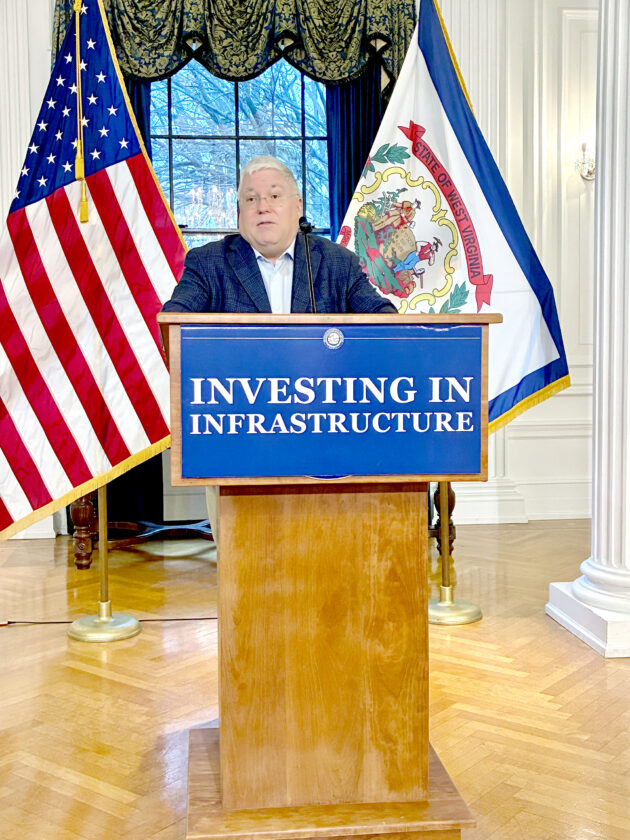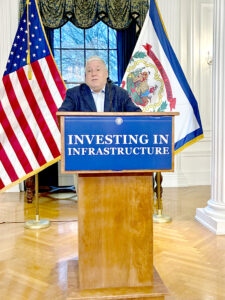West Virginia’s federal broadband application approved

MOVING FORWARD — Gov. Patrick Morrisey said West Virginia is ready to move money quickly to approved internet service providers after the state’s BEAD application was approved. -- Steven Allen Adams
CHARLESTON — West Virginia’s application to access a portion of $1.2 billion in federal broadband dollars was approved, paving the way for expansion of high-speed internet to unserved and underserved parts of the state.
The U.S. Department of Commerce’s National Telecommunications and Information Administration has approved the use of $546 million through the federal Broadband Equity, Access and Deployment program to connect more than 73,000 residents to last-mile broadband.
“Today is really a once-in-a-lifetime day for West Virginia, for many people across the state,” said Gov. Patrick Morrisey during a Friday morning press conference announcing the application’s approval. “This is a really big, big thing. … You’ve watched West Virginia slowly, but surely climb in terms of its broadband capacity. And I think today is meant to really help finally close that digital divide.”
Established by the Infrastructure Investment and Jobs Act passed in 2021 and signed into law by then-President Joe Biden, the B.E.A.D. program allocated more than $42 billion to expand high-speed broadband access across the United States. West Virginia was awarded $1.2 billion by the NTIA in 2023.
Both former U.S. Sen. Joe Manchin and current Sen. Shelley Moore Capito were involved in negotiations on the legislation, with Capito — then the ranking Republican member of the Senate Environment and Public Works Committee — instrumental in creating the B.E.A.D. program.
“I am thrilled that West Virginia’s B.E.A.D. plan has been approved by the Department of Commerce,” said Capito, R-W.Va., in a statement Thursday evening. “This means West Virginia is another step closer to better-connecting our homes, businesses, and classrooms across the state.”
U.S. Sen. Jim Justice, R-W.Va., also praised the acceptance of the BEAD application in a statement Friday morning. Justice was governor when West Virginia first received notice of its $1.2 billion B.E.A.D. award, directing the Office of Broadband to begin work on the application.
“We’ve made huge strides in bringing high-quality broadband access to West Virginia, and getting our communities connected to high-speed internet means everything,” Justice said. “This funding is an absolute gamechanger and will cover thousands of locations throughout the state, fostering new opportunities, jobs, education and investment.”
West Virginia submitted its final B.E.A.D. application on Sept. 4, seeking to use $625 million of the $1.2 billion. That triggered a 90-day comment period, though NTIA began approving B.E.A.D. applications this week, with 19 applications approved between Tuesday and Thursday prior to West Virginia’s approval.
West Virginia was one of three states ahead in the B.E.A.D. application process and prepared to send its final proposal in April. But Morrisey announced in March that West Virginia was granted a 90-day extension to submit its proposal.
The B.E.A.D. program was placed on a pause at the beginning of March by Commerce Secretary Howard Lutnick while the program was being reviewed. It was accused of favoring some technologies over others, being bogged down by cumbersome regulations and red tape, and being high in cost.
“I’m proud to say we’ve been working with the Trump administration every step of the way to try to have a successful application,” Morrisey said. “I had a very good meeting early on with Secretary Howard Lutnick, which I think helped set the stage because we were out in front early out of this office to make sure that we were addressing some of the issues and the concerns that people had.”
NTIA Administrator Arielle Roth joined Capito in August for a closed-door roundtable at the West Virginia Chamber of Commerce Annual Meeting and Business Summit at the Greenbrier Resort with officials from the state Office of Broadband, members of the Broadband Enhancement Council, lawmakers and representatives of internet service providers and utilities.
“In August, I had the opportunity to visit West Virginia and meet with Senator Capito, the state broadband office, and local providers to discuss the BEAD program and the state’s work to deliver a final proposal that embraced the benefit of the bargain reforms while addressing West Virginia’s unique connectivity challenges,” Roth said in a release Thursday. “This trip was invaluable in deepening my understanding of those challenges, and I appreciate Senator Capito’s dedication and longstanding efforts to connect every corner of her state.”
The majority of the $546 million would go to Bridgeport-based Citynet, Frontier Communications (now Verizon) and Comcast. The remainder of the funding would be divided among smaller regional internet service providers: Micrologic, GigaBeam, Prodigi Internet, Armstrong and Hardy Telecommunications. The smallest award will go to Elon Musk’s Starlink, a low-earth orbit satellite internet service provider.
Morrisey said Friday he is awaiting further guidance from the NTIA on what can be done with the remainder of the $1.2 billion awarded to the state.
“The administration hasn’t announced yet how those dollars are going to be permissible to spend, whether we’re talking about improved cell phone coverage, whether we’re talking about other monies related to AI and grid and other things,” Morrisey said. “The administration hasn’t announced that yet, but that money is still sitting there, and it’s still allocated for West Virginia.”
Morrisey cited numbers from the Marshall University Center for Business and Economic Research that estimated more than 1,500 immediate jobs could be created for various broadband expansion projects around the state, along with another 7,000 jobs for industries providing services for internet service providers.
“We’re not saying that the numbers are going to be exactly that, but it’s a needle mover,” Morrisey said. “It’s really good for the Mountain State, and it’s really exciting. I’m thrilled because I think this technological upgrade is going to connect every single corner of West Virginia and facilitate the jobs and the opportunities we need.”
Broadband expansion has been a priority for Capito as a former congresswoman and after becoming a senator in 2015, creating the Capito Connect program aimed at educating the public about the benefits of broadband access for homes and businesses. Capito said after years of delays under the Biden administration, West Virginia is finally ready to move out of the near-bottom rankings of states with the worst access to broadband.
“I have had dozens of conversations with the administration and our state officials, and while there is still a long road ahead to getting more West Virginians connected, we are well on our way with today’s announcement,” Capito said.


